The occasional sightings reported since 2015 in Maryland and communities around the Chesapeake Bay may raise speculations on the existence of alligators in Virginia.
However, Chesapeake Bay is too far north for alligators to make a home.
The alligators found in Virginia are most likely illegal pets released by their previous owners because of increased appetite and becoming too big to be accommodated.
The closest natural alligator habitat in Virginia is in North Carolina.
Scientists, however, speculate that the increasing temperature and climate change due to global warming may make it favorable for alligators to expand their territory further north.
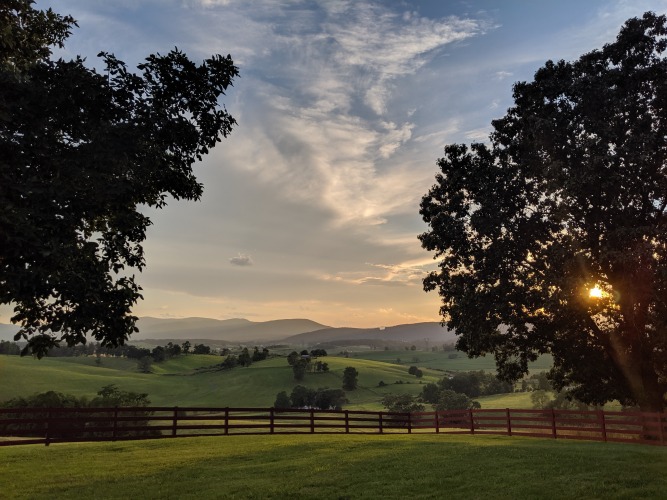
Contents
- Are There Alligators In Virginia?
- Can Alligators Find A Home In Virginia?
- How Comes Alligators Have Not Yet Made Virginia Their Home?
- Alligator Species in Virginia
- Is It Safe To Swim In Virginia?
- Do You Know The Best Swimming Holes In Virginia?
- Lakes In Virginia Where You Can Swim
- Beaches in Virginia Where You Can Swim
- Interesting Alligator Facts in Virginia
- Alligators vs. Crocodiles
- Four Safety Tips for swimming in Alligator-Infested waters
- Summary
- Virginia Safety Overview
- Frequently Asked Questions
Are There Alligators In Virginia?
There are no wild alligators in Virginia.
Years ago, the alligator population extended to Virginia, in the Great Dismal Swamp.
The uncontrolled hunting of alligators in the 1900s is also a cause of the extinction of our country’s national heritage (American Alligator).
The Endangered Species Act 1973, which included alligators on the list, led to conservation to save and increase the population of these magnificent reptiles.
In 1987, alligators were delisted from the Endangered Species Act as their numbers had increased.
However, the success of alligators’ conservation efforts in America is not yet fruitful in Virginia.
Alligators have not fully adapted to living in Virginia’s climatic conditions and prefer to live in the lower southern states of the U.S.
Can Alligators Find A Home In Virginia?
Yes, it’s possible. Climate change and increasing temperatures are becoming habitable for alligators in Virginia.
The state’s rivers and freshwater lakes are thriving with wildlife, and alligators will not starve in the areas.
How Comes Alligators Have Not Yet Made Virginia Their Home?
In the past, alligators thrived in Virginia.
Their decline to complete non-existence resulted from illegal and uncontrolled hunting in the 1900s.
The reptiles have, in some instances, found their way into Virginia.
The laws of Virginia require one to report the sighting of this protected reptile.
However, the state’s authorities either euthanize the alligators or deport them to North Carolina.
Residents of Virginia and officers alike seem to agree alligators should not exist among them.
Alligator Species in Virginia
If you come across an alligator in the wilds of Virginia, which is rare, it will be the American Alligator (Alligator Mississipiensis).
There are two main species of alligators, Alligator Mississipiensis, found only in America, and the Chinese Alligator (Alligator Sinensis), native and endemic to China.
Is It Safe To Swim In Virginia?
The absence of alligators in Virginia waters makes it safe to swim even in the wild.
Before plunging yourself into a river or lake, you should seek adequate information about it.
Alligators are not the only threats when swimming in natural water bodies.
Stick to the recommended swimming spots, and consult widely even with locals for the adventurous.
Nothing beats cooling off during summers in freshwater bodies, like playing in the water.
Virginia has plenty of new water bodies, from rivers to lakes, where you can splash the summer heat off.
Do You Know The Best Swimming Holes In Virginia?
Along the many water bodies in Virginia, some swimming holes are a must for nature and swimming enthusiasts. Here is a list of the best swimming holes in Virginia.
Dismal Falls
At the bottom of the 40-foot waterfall is a popular, lovely pool where you can cool off during your summer.
The place is also suitable for hiking and climbing while exploring the rock ledges in the area.
The dismal falls swimming hole is free and easily accessible.
Goshen Pass
The canyon along the three-mile gorge has several swimming holes.
Visiting the site will also allow you to engage in various outdoor activities.
James River
Along its course, the James River in Richmond has Belle Isle, a large water body perfect for swimming.
Along the James River, there are rapids and not suitable for swimming.
If you love kayaking, the James River is the place to be.
Whiteoak Canyon
Located in the Shenandoah Valley, Whiteoak Canyon has plenty of pools at the bottom of numerous waterfalls.
The 1.5-mile trail leading to the canyon is also a popular hiking spot.
You will enjoy a nature trail walk as you head to cool off in the pools of Whiteoak Canyon.
Cascade Falls
The big pool of water at the bottom of the fall is perfect for swimming.
Cascade Falls is one of the most beautiful in Virginia. You will enjoy the scenic beauty of hiking on the trail leading to the site.
Lakes In Virginia Where You Can Swim
Are you interested in lakes?
Virginia has plenty of lakes you can visit on your vacation and dip in them:
- Smith Mountain Lake
- Kerr Lake
- Lake Anna
- Lake Gaston
- South Holston Lake
- Claytor Lake
- Philpott Lake
- Lake Fairfax
- Lake Drummond
- Douthat Lake
- Sherando Lake
- Mountain Lake
- Burke Lake
Beaches in Virginia Where You Can Swim
Do you love swimming at the beaches?
Sample the following beaches along the Chesapeake Bay:
- First Landing
- Kiptopeke
Caution – In most areas, beach swimming is unguarded, and swimmers are at their own risk.
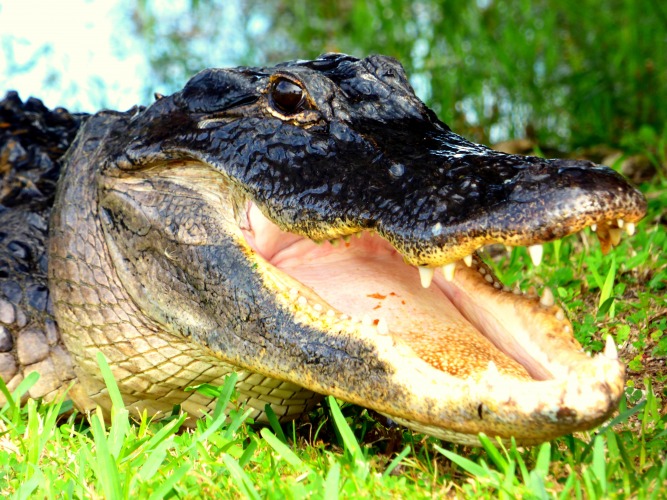
Interesting Alligator Facts in Virginia
In 2006, authorities in the state buried an adult alligator in the Pittsylvania County landfill.
Alligators are a protected species. Wildlife officials in Virginia confiscated the carcass after a trucker hauled it from Florida.
The trucker had run over the animal and carried it, intending to skin it for the hide to make boots.
The recent alligators sighted and caught in Virginia are barely adults.
Floods most likely bring in these gators.
Other interesting alligator facts
- Alligators are wise animals and will prepare for eventualities like drought. Alligators dig gator burrows, which retain water during dry periods. The holes harbor prey for the reptiles.
- An alligator’s life span is over forty years in the wild. However, an alligator can live more years away from other natural threats.
- The inactivity by alligators during cold weather is not hibernation. Freezing temperatures make alligators enter periods of dormancy known as “brumation.” When gators are in such a state, they are active and shy away from food because they cannot digest food due to low body temperatures.
- Alligators are part omnivorous, unlike the belief that the reptiles are entirely carnivorous. An alligator also feeds on fruits and berries that grow alongside the water bodies they occupy.
- Alligator mothers are very caring and protective of their young ones. They raise and protect the hatchlings for up to two years.
- Half of the entire body length of an alligator is in the tail.
Alligators vs. Crocodiles
If you are not sure you can differentiate an alligator from a crocodile, you are not alone.
Both animals are of the same order but in different families.
They are semi-aquatic reptiles and inhabit similar territories. At a glance, they resemble one another.
So, how can you tell an alligator apart from a crocodile?
To begin with, it is like the alligators and crocodiles agreed not to live in the same land.
Crocodiles, unlike alligators, are not native to America.
A croc can survive in salty water, but an alligator cannot.
Alligators do not possess the necessary glands to execrate salt in their bodies.
Physically, their snout looks different. An alligator has a broad mouth, U-shaped at the end.
A crocodile’s snout is narrow and sharp-pointed.
You can also differentiate an alligator from a crocodile by their color.
A gator will wear grey or black, but a crocodile shines in olive or tan.
Four Safety Tips for swimming in Alligator-Infested waters
Do not swim or wander near an incubating or nursing alligator
An alligator mother builds a nest on the banks or shoreline with mud and twigs.
Upon laying her eggs, she covers the nest with vegetation to create an incubator.
When the eggs hatch, she will transport the babies to shallow waters using her mouth.
The alligator nest and nursery are a no-go zone.
The mother guards both, and any intrusion is a threat.
Do not attempt to scare away a stubborn alligator
Although alligators are docile and opt to scatter away from humans, they can become aggressive in self-defense.
Alligators are gigantic, especially in water; they can quickly overpower a man.
A gator’s bite is mighty and fatal.
Ensure you seek medical attention upon an alligator’s bite.
Pets and young children should not swim in alligator-infested waters
An alligator’s prey choice is directly proportional to its age and size.
Alligators are known to capture large water birds and medium-sized mammals living within their territories.
A child or a pet’s splashes may attract a hungry alligator.
An alligator senses water vibrations in its mouth and can do maneuvers to grab a child or a pet for dinner mistakenly.
Never swim in a river or lake known to inhabit alligators
There is no need to provoke these gigantic reptiles.
As mentioned, humans are not part of an alligator diet.
But there is no need to tempt them with an easy catch.
Alligators are more adapted to staying in water for longer than humans and swim better.
A gator’s bite while in water increases the chances of drowning.
Summary
Reports have been increasing since 2015 indicating alligator sightings in Virginia.
Maybe the gators are trying to expand their territory up north as conditions become more favorable due to climate change.
Competition for habitat, food, and mates, may also contribute to some migration.
Currently, there are no wild alligators in Virginia.
You can only see alligators in zoos.
Enjoy your summer holiday splashing water in Virginia Rivers and Lakes without fear of alligators.
There are plenty of swimming holes in Virginia where you can have a good time with your loved ones.
Virginia Safety Overview
READ THE FULL REPORT: Virginia Safety Review
Safety Index:
- OVERALL RISK: LOW
- TRANSPORT & TAXIS RISK: LOW
- PICKPOCKETS RISK: LOW
- NATURAL DISASTERS RISK: MEDIUM
- MUGGING RISK: LOW
- TERRORISM RISK: LOW
- SCAMS RISK: MEDIUM
- WOMEN TRAVELERS RISK: LOW
Frequently Asked Questions
How many people die every year from alligator attacks?
Alligator attacks globally are rare.
Unlike aggressive and closely related crocodiles, alligators are submissive and rarely attack a human.
An alligator jaw is long and powerful, and its bite can cause a severe injury resulting in death or causing drowning.
Why are alligators primarily found in the southern parts?
Climate and weather conditions in the lower south are favorable for alligator hatchlings.
The low temperatures experienced up north affects newborn alligators, increasing the infant mortality rate.
Low temperatures make gators inactive for periods, and the hatchlings will die of hunger or freezing temperatures.
Do alligators hunt at night?
Alligators are mainly active from dawn to dusk.
Most alligator prey hunting happens during the day and will venture close to body water during this period, making alligators adapted to hunting during the daytime.
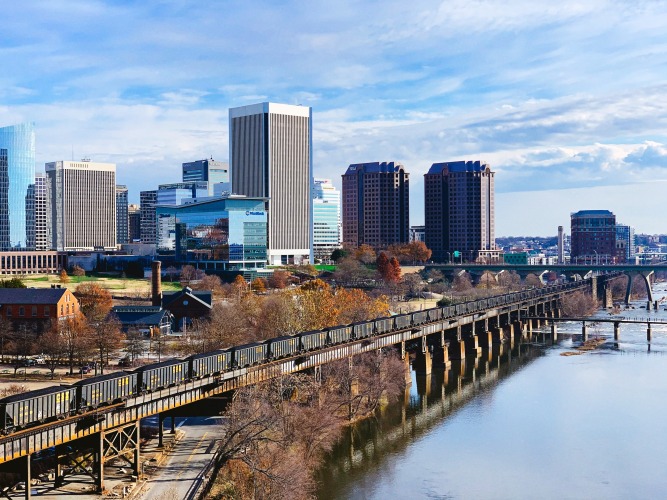
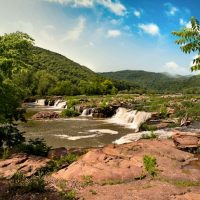




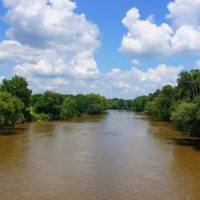





Alligator sightings in va should make it unsafe to swim in any lake or river, If there have been known sightings. 2015 -2023 would make me believe there are more now.